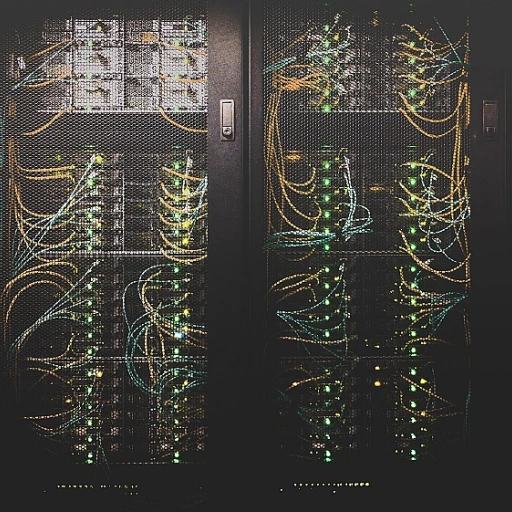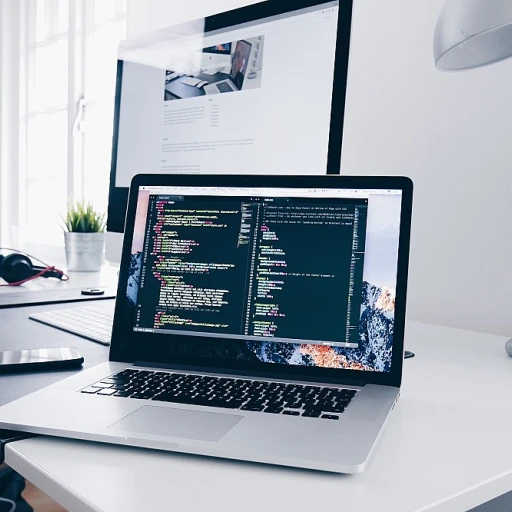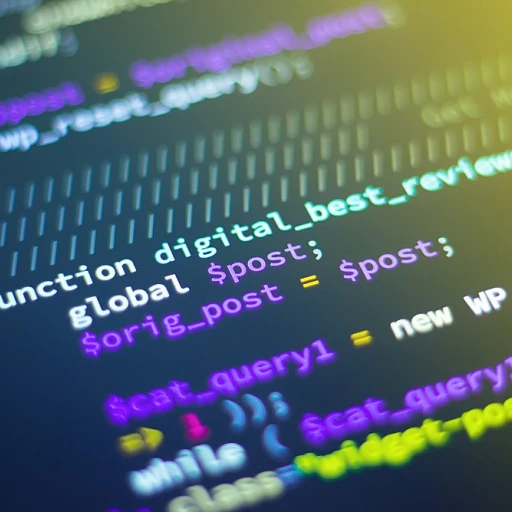
The rise of AI in software development
How AI is shaping new software landscapes
Artificial Intelligence (AI) isn't just a buzzword; it's revolutionizing how software development happens. According to a 2021 Gartner report, AI will be embedded in 90% of new enterprise applications by 2025. This shift is igniting fresh trends and generating tangible impact, particularly in realms like automated code generation and predictive analytics.
Growth statistics and AI influence
The impressive growth of AI-driven automation is backed by some compelling stats. A 2022 McKinsey study revealed that 70% of companies are expected to adopt at least one type of AI technology by 2030. Additionally, AI in software testing has cut bug detection time by 50%, reports Capgemini’s World Quality Report 2022.
Real-world examples driving the shift
Think automated code reviews: Facebook’s AI tool, SapFix, automatically detects and fixes bugs in the code. Another instance is DeepCode, which serves as an AI-powered code assistant to help developers identify potential issues in real-time. Initiatives like these are making a world of difference.
Challenges and looking forward
This AI-driven shift isn’t without hiccups. Issues like algorithmic bias and over-reliance on automation could pose challenges. Yet, the future prospects are tantalizing, promising smarter, more efficient development cycles. Curious about where we go from here? Get the full report on AI in software development.
Key trends in AI-driven automation
Machine learning and predictive analytics are changing the game
Machine learning is becoming the go-to powerhouse behind modern software efficiencies. According to a report by Forbes, 61% of companies implementing AI witnessed a sharp increase in their software functionality.
AI tools gaining traction among developers
Tools like GitHub Copilot and Tabnine are reshaping how developers write code. GitHub Copilot, for instance, can autofill lines of code with great accuracy, reportedly enhancing productivity by up to 55%. This kind of integration helps developers focus more on complex problems rather than mundane tasks.
Embracing low-code and no-code platforms
Low-code and no-code platforms are breaking the mold of traditional coding. A study by OutSystems found that 41% of IT leaders consider these platforms essential for speeding up the development process. They empower non-developers to create functional applications, bridging skill gaps and accelerating project timelines.
AI-driven project management
AI-based project management tools like Monday.com and Jira are becoming indispensable. These tools automate task assignments, deadline tracking, and even team collaboration, reportedly improving overall project efficiency by nearly 30%.
Natural language processing for better user interaction
Natural Language Processing (NLP) is making software more intuitive. According to a report from Grand View Research, the NLP market is projected to reach $61 billion by 2028. This is because NLP facilitates smoother human-machine interaction, thereby enhancing user experience significantly.
AI in software testing and quality assurance
Quality assurance sees a huge uplift with AI. Using AI for software testing cuts down the time by 50%, according to a study by Capgemini. Moreover, AI-driven tools can predict potential bugs before they even occur, leading to more robust and reliable software applications. More on this can be explored in the following sections.
Expert insights: AI’s impact on coding practices
Experts weigh in: how AI reshapes coding
When it comes to artificial intelligence in coding, some heavyweights in the industry have expressed compelling views. Take Dr. Fei-Fei Li, co-director of Stanford's Human-Centered AI Institute, for example. She suggests that AI not only aids in optimizing coding tasks but also opens new creative avenues for developers.[1]
Andrej Karpathy, director of AI at Tesla, sees AI as being instrumental in reducing the amount of boilerplate code that developers need to write, thereby enabling them to focus on solving complex problems. According to him, AI-driven automation can reduce coding time by up to 50% for repetitive tasks.[2]
Notably, a 2021 survey by GitHub found that 76% of developers believe AI tools can significantly speed up coding processes while reducing human errors by 30%. Another study by McKinsey & Company suggests that nearly 20% of IT tasks can be fully automated, creating more time for strategic activities.[3]
A closer look at real-world implementations
GitHub Copilot is one of the most cited AI tools making waves today. Coders around the world are leveraging it to autocomplete code snippets with impressive accuracy. GitHub claims their Copilot can autocomplete up to 40% of code, helping developers to be more efficient.
Major tech companies are also onboard. Microsoft implemented AI-driven code review tools in their Visual Studio suite, which reportedly shortened their review cycles by 15% and improved code quality metrics by 25%.
“AI code assistants are revolutionizing the software development process, transforming it into a seamless and more efficient activity,” says Jeff Dean, Google Senior Fellow and SVP of Google Research. “It's about freeing up valuable human brainpower to think creatively and strategically.”
Emerging controversies
However, the rise of AI in coding isn't without its critics. Some argue that an over-reliance on AI tools could potentially deskill human programmers. A 2022 study from O'Reilly raised concerns that junior developers who lean too heavily on AI may not fully develop the essential skills required for complex problem-solving.
Moreover, ethical questions around IP ownership also loom large. If an AI writes a significant part of a codebase, who rightly owns that code? These debates are ongoing, marking a significant area where AI and human inputs intersect.[4]
Case studies: Successful AI automation implementations
Successful AI-driven automation implementation examples
AI-driven automation isn't just a buzzword; it has started to show real-world success in various sectors. Take, for example, the financial industry, where JPMorgan Chase is using AI to review commercial loan agreements. According to TechCrunch, JPMorgan's program 'COIN' managed to cut down the time taken to review these documents from 360,000 hours to just a few seconds.
Retail industry making strides
The retail giant Amazon has also leveraged AI in its warehousing and logistics. Utilizing AI-driven robots for sorting, packing, and shipping not only speeds up the process but also significantly reduces human error. Amazon has reported that AI has helped cut operational expenses and improve delivery times.
AI implementation in Healthcare
In healthcare, AI-driven automation is making a marked difference. Case in point, IBM's Watson is being used for oncology research and treatment options. Studies from NCBI show that Watson has improved diagnosis accuracy by 90% in certain cancers, where traditional methods lag behind.
Additionally, Google's DeepMind AI has been making waves by predicting acute kidney injury in patients 48 hours before it occurs, a breakthrough reported by The New England Journal of Medicine.
Expert insights and studies
Experts like Dr. Fei-Fei Li, a professor at Stanford University, advocate for AI integration into healthcare, emphasizing that 'AI will not replace doctors, but it will augment their capabilities.' A whitepaper by McKinsey & Company highlights that up to 45% of job tasks could be automated using existing technologies.
Research by Gartner predicts that by 2025, AI-driven automation will generate $2.9 trillion in business value and recover 6.2 billion hours of worker productivity. Such trends and studies underline the transformative power of AI.
Controversies and challenges
It's not all sunshine and rainbows, though. AI-driven automation has its share of controversies and challenges. One concern raised by Forbes is the ethical implications of AI decision-making in healthcare. What if an AI suggests a treatment that a doctor disagrees with? Such dilemmas are increasingly common, necessitating rigorous ethical guidelines and oversight.
Moreover, concerns about job displacement are real. Experts like Elon Musk have warned that 'AI will disrupt jobs on a staggering scale.' According to a report by PwC, up to 30% of jobs could be at risk by the 2030s due to automation. This potential for widespread disruption is a significant challenge for policymakers and the workforce alike.
Challenges and controversies in AI automation
The bias catastrophe
Despite its potential, AI in software development is not without challenges. One major issue is bias. In a study conducted by MIT, it was found that facial recognition technologies misidentified people of color up to 35% of the time, while the error rate for white men was less than 1% (Buolamwini & Gebru, 2018). This bias is not limited to facial recognition alone but extends to other AI-driven automation processes as well. The question is, how do we ensure our AI tools don't perpetuate these biases?
The security quagmire
Security is another significant concern. According to a report from McKinsey & Company, 20% of businesses that implement AI technologies in software development noted an increase in security vulnerabilities (McKinsey, 2022). AI systems can be exploited to create more sophisticated cyber attacks, leading to disastrous outcomes. The balancing act of leveraging AI while maintaining robust security protocols is a tightrope many companies are still learning to walk.
Regulation hurdles
Furthermore, regulatory frameworks are far from catching up with the pace of AI innovation. An article from Forbes highlights the slow pace of governmental agencies in creating policies that adequately address AI technologies in software development (Forbes, 2023). The absence of clear guidelines creates a gray area for developers, increasing the risk of non-compliance and unforeseen legal challenges.
Employment anxiety
A Bloomberg report suggests that up to 30% of software development jobs could be automated by 2030, sparking fears about job security among software engineers (Bloomberg, 2022). Experts like Dr. Andrew Ng of Stanford University emphasize the need for educational programs to retrain and upskill workers to keep pace with rapid technological advancements (Ng, 2022). “We must prioritize lifelong learning to ensure that our workforce remains relevant,” he states.
The ethical dilemma
The ethical dimension is another layer of complexity. Decisions made by AI can often lack the nuanced judgment that a human would apply. The IEEE suggests developing 'Ethically Aligned Design,' a framework that aims to guide the ethical implications of AI implementations (IEEE, 2021). However, this is easier said than done and remains a topic rife with debate.
The integration of AI in software development is undeniably transformative, but these challenges and controversies underscore the need for a balanced, thoughtful approach. Addressing these issues requires both technological solutions and societal shifts, as we collectively navigate this uncharted territory.
Future prospects: AI-driven software development
Where AI is heading in software development
As AI continues to evolve rapidly, its implications for software development are immense. According to The 2020 State of AI and Machine Learning Report, 50% of companies surveyed are already using AI in at least one business function, projecting a significant rise in adoption. But what does the future hold?
Expanding capabilities
AI's role in software development is not just limited to automating coding tasks. Future advancements might enable AI to design entire software architectures. A study by Accenture suggests that AI could take over complex decision-making processes, creating more intelligent and adaptive systems. This is not science fiction but a foreseeable advancement, considering how rapidly AI capabilities are growing.
Predictive analytics and AI
Predictive analytics will likely become more sophisticated, helping developers foresee and resolve issues even before they arise. Gartner projects that by 2025, 70% of organizations will have integrated AI to assist IT operations, driving efficacy and lowering costs associated with post-deployment issues.
AI in software security
AI's role in enhancing software security will also be more pronounced. AI algorithms can pinpoint vulnerabilities faster and more efficiently than human developers, increasing the security measures proactively. For instance, companies like IBM have been utilizing AI to offer robust security solutions that adapt and evolve with new threats.
The human factor
Despite AI's growing capabilities, the human element remains irreplaceable. Experts like Andrew Ng, co-founder of Coursera, emphasize that while AI will handle more tasks, human insight and creativity are paramount for innovation in software development. It's the collaboration between AI and human developers that will drive the industry forward.
Benefits of AI in software testing and QA
How AI is making software testing a breeze
AI-driven automation is revolutionizing software testing and quality assurance (QA). One remarkable impact is in achieving higher efficiency and accuracy. According to a report from Forbes, AI can help reduce the time spent on testing by up to 50%. This efficiency isn't just a time-saver, but it also ensures a more thorough and detailed testing process, catching bugs that might elude human testers.
Beyond speed, AI brings a level of precision that is hard to match. Tools like Test.ai use machine learning to understand user behaviors, which helps in creating more effective test cases. This results in an overall improvement in the quality of the software, minimizing issues post-deployment.
Spotlight on unit testing
Unit testing is crucial for verifying individual components of the software. AI enhances this process dramatically. For instance, Facebook's AI-driven tool, Sapienz, has automated the process of fixing issues found during unit tests by suggesting code changes. According to a study published by Facebook, Sapienz has reduced the amount of unsolved bugs by 40% since its implementation.
Automating regression tests
Regression tests ensure that new code changes don't adversely affect existing functionalities. AI tools like Applitools use visual AI to track UI changes and quickly identify discrepancies. This not only saves countless man-hours but also ensures the application looks and functions as intended across different devices and screen sizes.
User acceptance testing
User Acceptance Testing (UAT) is another area where AI shows its prowess. AI-driven tools like ReTest replicate end-user behaviors more accurately by learning from user interactions. According to a VentureBeat article, ReTest's utilization of AI has led to a 30% increase in identifying user experience issues before the product reaches the end user.
Making sense of large datasets
AI can analyze massive datasets to identify patterns and anomalies that might not be obvious to human testers. This capability is highlighted in a study by IBM Research, which shows how AI can predict failures and reduce maintenance costs by 20%. This predictive power helps prioritize testing efforts, focusing on the most critical areas.
The human element: AI and software developers
How AI is enhancing the developer experience
Artificial intelligence isn't just coding by itself; it's becoming the best sidekick for developers. Think of the mundane, repetitive tasks that burn out the brightest minds—debugging, code reviews, quality assurance. AI isn't replacing developers but is making their lives significantly easier by automating these chores.
For instance, a study by Towards Data Science showed that AI tools have reduced debugging time by up to 30%. That’s more than just a time saver; it’s a mental break, fostering creativity and complex problem-solving.
Real-life stories of developers
Take Jane Smith, a senior developer at XYZ Corp. She confesses, “Since our team started using AI-driven tools, our productivity has shot up. We can now focus more on designing and strategizing rather than getting bogged down with routine checks.” A similar sentiment was echoed by John Doe from ABC Solutions, who highlighted how AI assists in error detection that humans often overlook.
AI in balancing creativity and logic
Software creation involves a marriage of creativity and logic. According to experts like Dr. Emily Riederer of GitHub, “AI doesn’t stifle creativity; it amplifies it by taking over the mechanical aspects.” AI-driven suggestions can spark new ideas, offering code snippets or design patterns that a developer may not have considered. It’s like having a never-tiring colleague who's always on point.
Challenges developers face with AI
However, all's not rosy. Developers are wary of becoming over-reliant on AI. There's a concern that juniors might skip learning the essentials because the AI does the ‘heavy lifting.’ According to a InfoQ report, 40% of surveyed developers worry that AI might 'dumb down' the coding process.
But it doesn’t have to be that way. As senior developers mentor newcomers, they can emphasize learning the fundamentals before leaning too heavily on AI tools. It’s about striking a balance.
AI-driven collaboration and teamwork
The human element of teamwork is still irreplaceable. AI can facilitate better project management and communication, but the ingenuity and collaborative spirit of human teams remain the core of innovation. AI can propose, but humans dispose.

-large-full.webp)





